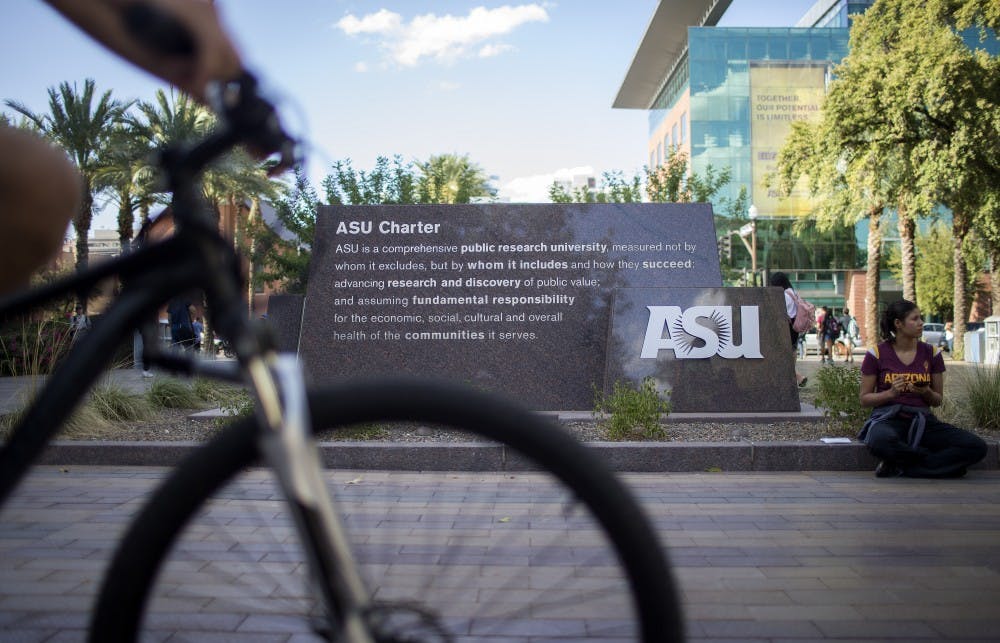Over 500 ASU faculty, staff and students have signed a letter addressed to President Michael Crow and administration officials asking to postpone the start of in-person instruction for the fall semester until three recommendations, based on eight specific concerns, are implemented .
"Communication regarding the reasoning for ASU’s return to in-person instruction at this time and regarding what will happen when an eventual outbreak occurs on campus has been lacking," the letter, published by a group called the ASU Community of Care Coalition, said.
Lee Bebout, an English professor who is part of the coalition, said over 100 faculty, staff and graduate students, including a number of anonymous groups, contributed to the creation of the letter and group.
The letter asks the University to hold off beginning on-campus classes until the University meets three recommendations: It establishes public, science-based metrics to inform a return, all faculty, staff and graduate students' accommodation requests to work remotely are accepted regardless of reasons given, and a committee, "representing all stakeholders in the ASU community," is created to advise University officials on "COVID policy."
The three minimum recommendations are based on eight concerns the group has:
- While undergraduate students have a variety of options going into the fall semester, the options for faculty, staff and graduate students are more limited.
- The University "cut off" faculty and staff from the fall semester decision-making process and has not been transparent with its plans.
- Benchmarks for a safe return and contingency plans to help mitigate the risk students and faculty will face are not clearly defined.
- The return of thousands of faculty, students and staff not only puts the ASU community at risk for exposure to the coronavirus, but also increases the risk for surrounding areas.
- The recent decline in cases throughout the state does not mean it is safe for the University to reopen. The letter points out that "many local K-12 and universities in the state districts do not plan to return to in-person instruction until October."
- The letter said the University was not fair and transparent with accommodation requests. Many faculty and staff "felt pressured into not asking for an accommodation." The letter also says faculty and staff should not have to disclose private health information to allow them to teach remotely, nor should the University "be pressuring, implicitly or explicitly, faculty and staff into making decisions that endanger their health to benefit the university."
- Faculty and staff are worried that only certain colleges would have their concerns regarding returning in-person addressed based on the "financial standing" of their college.
- The in-person return will put non-ASU employees who are part of the community, such as custodial and food services staff, at risk for being exposed to the coronavirus.
Katie Paquet, a University spokesperson, said in an emailed response to the letter that Crow and Provost Mark Searle will work this week to address the concerns raised in the letter in discussions and communications with the entire ASU community.
"There are many very legitimate ideas, questions, requests and concerns that have been expressed by this very committed community of people," Paquet said. "ASU will continue to provide a university-wide framework for managing and mitigating the spread of COVID-19, which to the maximum extent possible empowers individual members of the ASU community to live, work, teach, research, and serve the people of Arizona in whatever ways best address the needs of each individual member of the ASU community."
While the goal is to return to campus with in-person instruction, members of the ASU community want to ensure that the decision to return is informed and that the timing is right.
"One of the things that we're all interested in is avoiding some sort of catastrophic situation that makes the university look terrible," said Alexander Aviña, an associate professor of Latin American history in the School of Historical, Philosophical and Religious Studies who was part of the group that contributed to the letter.
Bebout said that many faculty didn't want to release the letter, hoping "ASU would have made the right choice," but are now releasing the letter feeling "like we have no other option."
In preparation for the return to campus, the University released guidance for faculty advising them on what to do if a student attends an in-person class and tests positive for the coronavirus.
The University also announced it will not be publishing campus-wide COVID-19 data, including the number of cases within the ASU community.
Despite the recent announcements and guidelines, many faculty members are still unsure about the specifics driving the reopening and what the semester will look like.
"I sympathize with the students' desires to be on campus, but I think it will be morally irresponsible if we did not make their health and safety the top priority, rather than their comfort and desires," said Laurie Stoff, a principal lecturer and faculty fellow at Barrett, the Honors College, who helped draft the letter.
The letter is now open for anyone to sign.
"To be clear, as faculty, staff, and students, we want to return to campus and we believe in our educational mission," the letter said. "But the timing of that return must be determined by scientific benchmarks and the input of the workers and students who will be shouldering the risk. This time of crisis requires us to come together, but to do this, we must all have a seat at the table."
Reach the reporter at wmyskow@asu.edu and follow @wmyskow on Twitter.
Like The State Press on Facebook and follow @statepress on Twitter.

Wyatt Myskow is the project manager at The State Press, where he oversees enterprise stories for the publication. He also works at The Arizona Republic, where he covers the cities of Peoria and Surprise.




